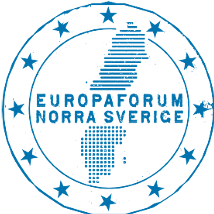DG-ENV.D1 Land Use & Management
Europaforum Norra Sveriges response to the EU Commission’s public consultations on the new EU Framework for Forest Monitoring and Strategic Plans
Europaforum Norra Sverige (EFNS) is a network for politicians at the local and regional levels from Norrbotten, Västerbotten, Jämtland Härjedalen and Västernorrland. EFNS is a meeting place and knowledge arena where EU policies are analysed and discussed as regards how they affect northern Sweden. EFNS monitors European issues to influence EU legislation, the EU’s strategies and action programmes and the EU budget. The objective of EFNS is to safeguard the interests of northern Sweden both in the European arena and in relations to the national level in matters with a clear European perspective.
Our views in brief:
- The EU’s knowledge of the state of forests within the Union needs to increase. To achieve this, available and existing data from member states should be collected and processed at EU level to be comparable between countries.
- Secure information about forests, which can form the basis for decisions about forest management, cannot be obtained solely through remote sensing. Decisions on forest plans and forest management must also be made through observations from ground level and through a combination of ground-based information and remote sensing.
- Fragmentation, as diversity in regards of plans and forest management among forest owners, should not be seen as something negative. On the contrary, this provides diversity in the forest landscape which means higher resistance to various types of disturbances, including climate change.
- Several trends for the forests within the EU are currently good, with an increasing amount of forest land, an increased amount of bound carbon and increased timber extraction. In order to secure these positive trends, the factors that contribute to them should be analyzed.
Important with increased knowledge at the EU level
We welcome the proposal for comparable information on the status and condition of forests in the EU. Knowledge is essential for trade-offs and choice of measures to ensure that forests are resilient to disturbances such as insect attacks, fires and damage from snow and damage caused by wild animals.
We agree that secure national statistics are needed within EU member states to observe trends and the status of forests but would like to emphasize that monitoring systems and comprehensive national statistics already exist in many member states. In Sweden, there is data since the 1920s.
The countries that currently lack systems for acquiring knowledge should be supported to create systems suitable for them and their forests.
Once the national statistics have been collected, they need to be processed at EU level to become comparable between countries and form the basis for decision-making, for example in the proposal on Binding targets for the restoration of nature.
We believe that it is cost-effective and logical to use the knowledge that already exists nationally, and we believe that there is an understanding and acceptance of this among the forest owners on whose land the information is collected.
Observations from ground level
Within the EU and within the member states, there are large variations between forests. Therefore, we want to emphasize the importance that decisions about forest management should continue to be based to a decisive extent on the information that foresters, forest owners and forest managers get by being close to the forests and observing events and trends from ground level. Secure information about forests, which can form the basis for decisions about forest management, cannot be obtained solely through remote sensing.
Diversity is important
In the draft law, the EU Commission writes that effective decision-making today is hindered by the fact that the available information is limited, and forest planning thus becomes fragmented.
We believe that this description of reality needs to be nuanced. Knowledge is lacking at the EU level, and it is good if it increases, but at the national and local level where the decisions are to be made, there is already a great deal of knowledge and often good and reliable national statistics.
We also want to emphasize that fragmentation, i.e. diversity in plans and forest management among foresters and landowners, should not be seen as something negative.
On the contrary, this provides a diversity in the forest landscape which means higher resistance to various types of disturbances including climate change.
For this reason, it is very important for the EU’s forests to continue to develop in the right direction that the owners and managers of the forests, those who know the forests best, continue to feel great responsibility for the health of the forests, and at ground
level can observe risks such as insect attacks so that these are stopped before they turn into large attacks that are difficult to stop.
Several positive trends
Statistics from the report State of Europe´s forests 2020 indicate that today there is no imminent need for changes in forest management within the EU. Despite local problems with insect infestation and risks of flammable biomass remaining in the forests, several overall trends are good. Between the years 1990 and 2020, the forest area within the EU increased by 9 percent, the amount of stored carbon by 50 percent and the extraction of wood by 40 percent.
An initiative with increased forest knowledge at EU level should include an analysis of what creates the good trends in the forests, and also which factors are behind lesser good trends such as an increased amount of insect attacks and risks of fires with flammable dry biomass remaining on the forest floor.
